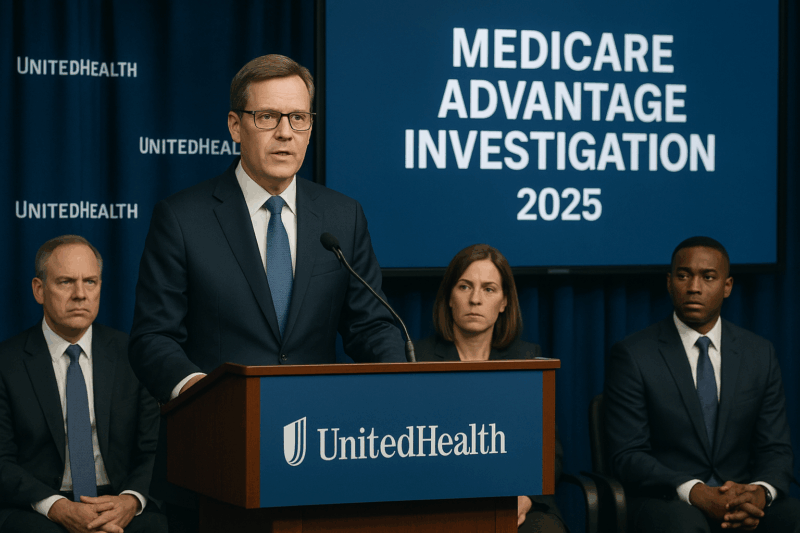On July 24, 2025, the Chicago Tribune reported that UnitedHealth Group, the largest provider of Medicare Advantage plans in the U.S., is under federal criminal and civil investigations by the Department of Justice (DOJ) for its billing practices. The probes, focusing on potential fraud through inflated diagnoses, add to a tumultuous year for the company, marked by the murder of its UnitedHealthcare CEO, a cyberattack, and significant financial setbacks. This article examines the details of the investigations, the context of UnitedHealth’s challenges, stakeholder reactions, and the broader societal implications for healthcare accountability and public trust, as detailed in the Tribune article and supplemented by additional sources.
Details of the Investigations
UnitedHealth Group confirmed on July 24, 2025, in a Securities and Exchange Commission (SEC) filing that it is cooperating with DOJ criminal and civil investigations into its Medicare Advantage (MA) billing practices. The company, which covers over 8 million people through its UnitedHealthcare MA plans, proactively contacted the DOJ after media reports, particularly from The Wall Street Journal, surfaced about the probes. The investigations center on allegations of “upcoding,” where UnitedHealth allegedly recorded exaggerated diagnoses to trigger higher payments from Medicare, which pays more for sicker patients.
Key aspects of the investigations include:
- Criminal Probe: Initiated by the DOJ’s healthcare-fraud unit, this investigation, active since at least summer 2024, explores potential Medicare fraud. The Wall Street Journal reported in May 2025 that prosecutors interviewed former employees about whether UnitedHealth pressured doctors to submit claims for conditions that boosted payments. The exact nature of criminal allegations remains unclear, but the focus is on UnitedHealthcare’s MA practices.
- Civil Probe: Launched earlier in 2025, this investigation examines whether UnitedHealth inflated diagnoses to secure extra payments. The DOJ alleges that from 2009 to 2016, UnitedHealth received $7.2 billion based on unsupported billing codes, costing Medicare $2.1 billion more than necessary. A March 2025 ruling by Special Master Suzanne Segal dismissed a decade-long civil case, finding no evidence of wrongdoing, but new probes continue.
- Third-Party Review: UnitedHealth initiated an independent review of its coding, managed care, and pharmacy services practices to address concerns and enhance transparency, as announced in June 2025 by new CEO Stephen Hemsley.
UnitedHealth maintains that its practices are “among the most accurate in the industry,” citing Centers for Medicare and Medicaid Services (CMS) audits showing 89% of billing codes supported by medical records. The company also referenced the 2025 Special Master ruling to bolster its defense.
Context of UnitedHealth’s Challenges
UnitedHealth Group, with $400 billion in 2024 revenue, is the nation’s largest health insurer and a Fortune 500 leader, operating UnitedHealthcare (insurance) and Optum (physician practices, pharmacies, and technology). Its MA business, generating $139 billion in 2024, is its largest revenue driver, covering over 8 million members. However, 2024 and 2025 have been fraught with crises:
- CEO Murder: On December 4, 2024, UnitedHealthcare CEO Brian Thompson was fatally shot in Manhattan by suspect Luigi Mangione, sparking public outrage over care denials and fueling scrutiny of UnitedHealth’s practices.
- Cyberattack: A 2024 cyberattack on Optum’s Change Healthcare unit disrupted one-third of U.S. healthcare payments, costing the company millions and exposing data vulnerabilities.
- CEO Resignation and Financial Woes: In May 2025, CEO Andrew Witty resigned abruptly for “personal reasons” after UnitedHealth suspended its 2025 financial forecast due to unexpectedly high MA medical costs. Stephen Hemsley, CEO from 2006 to 2017, returned to lead the company.
- Stock Decline: As shown in the finance card above, UnitedHealth’s stock (UNH) fell from $630.73 in November 2024 to $278.58 by July 24, 2025, a 55% drop, driven by investigation reports, high medical costs, and public backlash. The stock closed at $279.75 on July 24, down 1.5% in morning trading and 3% ($281.78) by afternoon.
The investigations follow a February 2025 Wall Street Journal report alleging UnitedHealth generated $8.7 billion in 2021 from diagnoses by its employed doctors that patients were never treated for, prompting Senator Chuck Grassley (R-Iowa) to launch an inquiry into billing practices. Additional scrutiny includes a DOJ antitrust probe into UnitedHealth’s Optum acquisitions and a lawsuit against its proposed $3.3 billion purchase of Amedisys.
Stakeholder Reactions
UnitedHealth Group
UnitedHealth asserts confidence in its practices, emphasizing CMS audits and the 2025 Special Master ruling. The company criticized The Wall Street Journal for “misinformation” and a “campaign” against MA, framing its compliance as industry-leading. It proactively engaged the DOJ to address media-driven concerns and launched third-party reviews to reassure stakeholders.
Department of Justice and Regulators
The DOJ, alongside the Department of Health and Human Services’ Office of Inspector General, has intensified scrutiny of MA plans, with UnitedHealth as a primary target due to its market dominance. A DOJ spokesperson declined to comment on the probes, but interviews with former employees and doctors suggest a focus on upcoding and pressure to inflate diagnoses.
Investors and Analysts
Investors reacted sharply, with UNH shares dropping 16.5% on May 15, 2025, after the criminal probe was reported, and 1.5% to 3% on July 24, 2025, per the finance card above. Analysts like Julie Utterback from Morningstar suggested the market’s reaction might be an overreach, given only 15% of UnitedHealth’s insurance members are in MA plans. James Harlow of Novare Capital Management noted the uncertainty’s impact on profitability.
Public and Critics
Public sentiment, amplified by Thompson’s murder, is highly critical, with X posts like @CNviolations decrying MA denials and delays. Health advocates, including the American Economic Liberties Project, cite UnitedHealth’s history of upcoding, care denials, and anticompetitive practices, with 12 reports and five lawsuits for overbilling. @democracynow highlighted a New York Times exposé on UnitedHealth’s intimidation of critics, including a breast cancer surgeon dropped as a provider after exposing abusive practices.
Policymakers
Senator Grassley’s inquiry and a Senate subcommittee report criticized UnitedHealth’s rising denial rates (10.9% in 2020 to 22.7% in 2022) and use of AI to deny claims, fueling calls for reform. Democratic lawmakers, like Senator Elizabeth Warren, linked UnitedHealth’s issues to broader MA program flaws, citing a 2024 Medicare Payment Advisory Commission report estimating MA costs taxpayers $83 billion more annually than traditional Medicare.
Societal and Policy Implications
- Healthcare Fraud and Costs: The DOJ probes highlight systemic issues in MA, where private insurers like UnitedHealth may exploit billing practices to inflate profits, costing taxpayers billions. A 2025 Federal Trade Commission report noted UnitedHealth’s 7,700% markups on its own providers, exacerbating costs.
- Public Trust: Thompson’s murder and care denial complaints have eroded trust in insurers, with a 2025 Gallup poll showing only 40% of Americans trust health insurance companies, down from 50% in 2020. X posts reflect anger over denials, amplifying calls for accountability.
- Regulatory Oversight: The investigations underscore the need for stronger CMS oversight of MA plans. Proposals include restricting chart reviews and enhancing audits to curb upcoding, as CMS considered in 2014 but abandoned under industry pressure.
- Market Dominance: UnitedHealth’s vertical integration, owning 90,000 physicians through Optum, raises antitrust concerns. The DOJ’s lawsuit against the Amedisys acquisition reflects fears of market consolidation, potentially limiting patient choice.
- Medicare Advantage Viability: The probes question MA’s promise of cost-effective care, with critics arguing it prioritizes profits over patients. This parallels broader 2025 accountability debates, like the Epstein files review and Chicago Public Schools’ budget crisis, where institutional trust is at stake.
Broader Context
UnitedHealth’s woes align with other 2025 stories, including the Epstein files review, where political pressure misallocated resources, and Chicago Public Schools’ $734 million deficit, reflecting fiscal strain. The Encino murders and IMPD officer arrests highlight public safety concerns, while Paramount’s settlement with Trump underscores media-political tensions. Nationally, UnitedHealth’s investigations resonate with efforts to combat fraud, as seen in DOJ actions against other insurers and Illinois ICAC Task Force initiatives against child exploitation. Globally, the case reflects debates over privatized healthcare, similar to critiques of for-profit systems in Canada and the UK.
Conclusion
UnitedHealth Group’s cooperation with DOJ criminal and civil investigations into its Medicare Advantage billing practices marks a critical juncture for the healthcare giant, already reeling from a CEO’s murder, a cyberattack, and financial losses. The probes, focusing on alleged upcoding, highlight systemic flaws in MA and fuel public distrust, as seen in X posts and advocate critiques. With UNH shares down 55% from their November 2024 peak, as shown in the finance card above, and ongoing regulatory scrutiny, UnitedHealth faces pressure to reform its practices. This saga, set against 2025’s broader accountability debates, underscores the urgent need for transparency and oversight in healthcare to protect patients and taxpayers.






